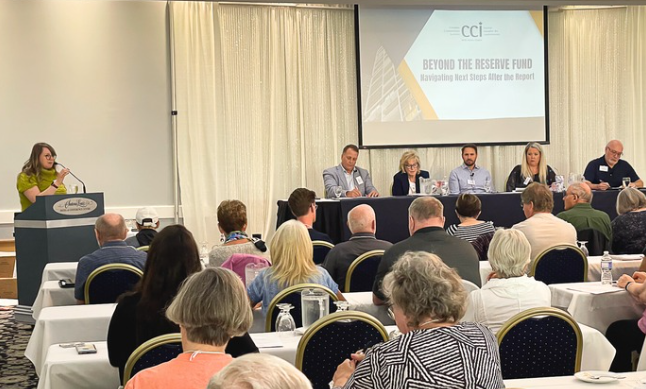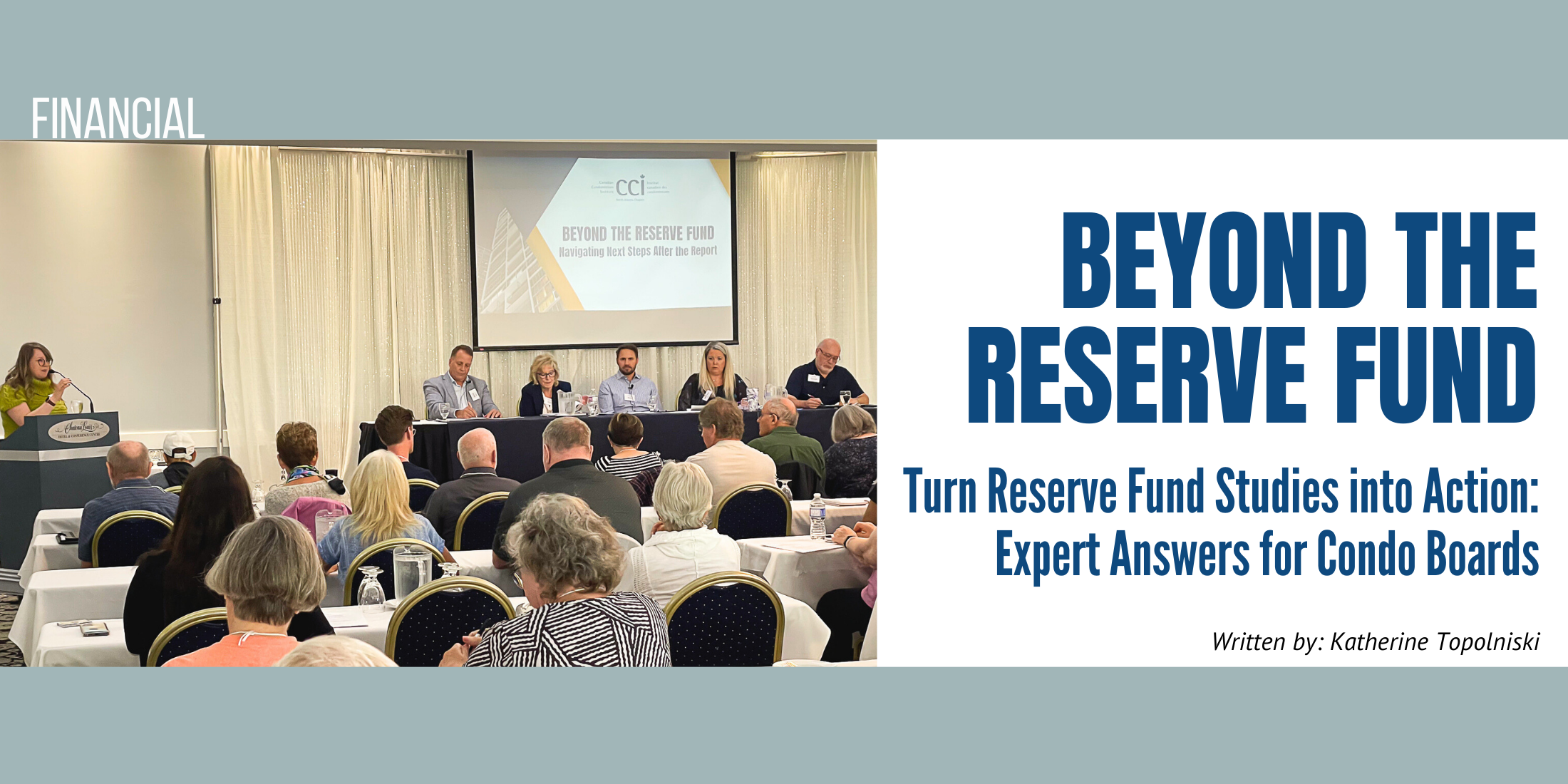Written by: Katherine Topolniski
Source: Answers contributed by the panel of experts
A panel of experts offered their insights and actionable guidance for condo boards navigating the critical steps that follow a Reserve Fund Study.
When it comes to managing reserve funds effectively after completing a Reserve Fund Study (RFS) report, condo boards and managers face crucial next steps. To provide expert guidance on moving forward after an RFS, CCI North Alberta recently hosted Beyond the Reserve Fund: Navigating Next Steps After the Report, a sold-out seminar with a panel of specialists from key areas of the condo industry.
The panel discussion, moderated by Rebekah Barron from Realty Key Group, included General Contractor– Leo Leibel (Restruction), Accountant–Barb Surry (CMA), Engineer and Building Envelope Consultant–Billy Huet (Wade Consulting), Reserve Fund Planner–Shantel Kalakalo (Kalham Consulting), and Condo Document Reviewer–Gary Caouette (Bylaw Consultants).

Photo (from L to R): CCINA’s Executive Director, Katy Campbell welcomes the panel; Leo Leibel, Barb Surry, CMA, Billy Huet, P.Eng., Shantel Kalakalo, & Gary Caouette.
The seminar offered 110 attendees unique access to a panel of experts there to discuss critical topics like accounting for expenditures, legislative requirements, preventive maintenance, five-year project planning, and identifying red flags in document reviews. Afterward, the audience connected directly with panellists and the moderator in breakout roundtable discussions, diving deeper into these important areas.
Our panellists generously answered many submitted and live questions, some of which we’ve compiled below to support condo boards and managers in developing effective, actionable strategies for reserve fund management.
Reserve Fund Planning Questions Answered:
Do you recommend involving owners in developing the reserve fund plan to encourage buy-in?
Yes, it’s beneficial to involve unit owners in the high-level planning to gain buy-in; however, keep the details within the board. Plans, pricing, and timelines may change over time, and it’s not practical to involve all owners in the day-to-day aspects of the project. If there is a qualified unit owner, you might consider including them in specific discussions. Ultimately, the board is responsible for handling the details and decisions.
Are boards required to share five-year plans with owners?
Yes, the plan must be shared with all unit owners. According to the Condominium Property Act (CPA) regulations:
Section 20.52(1)(a)(ii): An information statement provided to owners must include the amount of the capital replacement reserve fund and copies of reserve fund plans, reports, and annual updates.
Section 23(4) and (6): After approving the reserve fund plan, the board must provide owners with a copy of this approved plan before collecting any funds. Owners must be informed of any fund allocations and future expenditures based on the reserve fund report.
Once boards begin the five-year plan, are they required to follow it strictly, or can it be adjusted as needed?
The five-year plan should be updated as needed to reflect the anticipated reserve fund expenses for the year. The initial plan should include the recommendations from the
eserve Fund report and then be updated accordingly. It is essential to keep unit owners informed. Consider sending out an annual update to the five-year plan to ensure owners are aware of any changes. This annual update can then become your new five-year plan.
Would a board meet its obligations if it reduced annual reserve fund contributions by 30% to 60% from the approved plan?
The CPA does not mandate strict adherence to every recommendation in the Reserve Fund Study (RFS). The board has the authority to adjust contributions in compliance with the CPA and Sections 37 and 38, as long as owners are informed of any changes. Owners may ask the board to explain significant alterations in contributions or requirements outlined in the reserve fund plan.
How should boards address significant price increases in studies completed during or before COVID-19?
Adjust your budgets and plans to reflect current costs. While the RFS may account for general inflation, it doesn’t account for unexpected cost increases driven by external factors. Update your plan annually or more frequently if needed, and ensure that unit owners are informed of any adjustments.
What constitutes a major repair or replacement? What is “reasonable and sufficient,” and does it include items not in the RFS?
There’s room for interpretation, but adhering to the guidelines in Sections 37(2) and 38(1) of the CPA and Section 28 of the Regulations is advised. Occasionally, items not listed in the RFS may be eligible for reserve fund coverage. If unsure, consult your accountant or legal advisor or reserve fund provider. Establishing a contingency fund within the operating account, in addition to your reserve fund, can provide flexibility for unanticipated expenses while staying compliant.
Major repair is a repair that would allow the components to realize their expected life or allow the component to exceed its expected life and is not considered regular maintenance.
Reasonable – Covers “predictable expenses” yet maintains a cash stream that flows as close to the Safety Margin as possible.
Sufficient – The reserve fund does not fall below Safety Margin, required to help offset “unpredictable expenses”.
If you are anticipating an expense to be paid from the reserve fund, ensure your Reserve Fund Provider is aware of this to ensure this component is included in the reporting.
If an expense isn’t anticipated by the RFS but would be appropriate as a reserve fund expense, can the board use reserve funds?
Generally, expenses should be anticipated in the reserve fund study and budgeted accordingly. However, if an unforeseen expense is reasonable as defined by Sections 37(2) and 38(1) of the CPA, it may be covered by the reserve fund. Consult your accountant or legal advisor if uncertain. A resolution or levy may be necessary if this expense results in a shortfall. Any known future expenses should be included in the updated RFS.
If an expense anticipated in the RFS exceeds the estimated amount, can the board use reserve funds to cover the total expense?
Yes, as long as the expense is an approved reserve fund expenditure, the board may use the reserve fund to cover it. The RFS is a guide, and the board determines the amount spent A special resolution to use the reserve fund may be required or a special levy may need to be issued if this expense results in a shortfall in the reserve fund.
Can the board cover the remainder from operating funds? Would owner permission be required in either scenario?
Yes, the operating account can be used to address shortfalls with respect to Reserve Fund expenses. Funds may be transferred from the operating account to the reserve fund without owner approval, as this falls within the board’s decision-making scope.
Note: As per Section 27(2)(3) funds must not be commingled and as such reserve funds cannot be transferred to the operating account to cover operating expenses. Surplus funds in the operating account can be transferred to the Reserve Fund. A special resolution is required from owners if reserve funds are used for improvements or upgrades to common property.
Strengthening Reserve Fund Management
Navigating the complexities of reserve fund management requires both knowledge and flexibility, especially as conditions change over time. The questions and answers compiled here reflect common concerns and practical strategies—we hope these insights empower your board to make well-informed decisions and create a resilient, future-ready reserve fund.
By following expert guidance, maintaining transparent communication with owners, and regularly updating plans, condo boards can fulfill their regulatory obligations while safeguarding their community’s financial well-being. Continuous learning and proactive planning are key to effective condo governance, and we encourage you to take full advantage of the educational resources CCI North Alberta offers.

